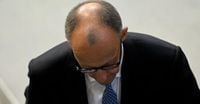On May 6, 2025, Friedrich Merz, the leader of the Christian Democratic Union (CDU), faced a significant setback as he failed to secure the necessary votes to form a government in Germany. The Bundestag, the federal parliament, did not grant confidence to his coalition government, which included the CDU, the Christian Social Union (CSU), and the Social Democrats (SPD). In a surprising turn of events, Merz received only 310 votes in favor, falling short of the 316 votes required for a majority out of the 328 available to his coalition. This unprecedented failure marks the first time since 1949 that a chancellor candidate has not been elected in the first round of voting.
The voting results were met with a deafening silence in the chamber, as 18 members of Merz's coalition chose not to support him. The current political climate in Germany is tumultuous, with the country facing economic challenges, including a recession driven by stagnant exports and protectionist policies from the United States. The situation is dire, and the implications of this vote extend far beyond Merz’s personal ambitions; they signal a potential political crisis in a nation grappling with significant economic and geopolitical pressures.
As the results unfolded, former Chancellor Angela Merkel was among the attendees, observing the proceedings with a look of disbelief. The Bundestag now has 14 days to either vote for a new confidence in Merz or select an alternative candidate to form a government. However, the prospect of finding a viable alternative seems unlikely given the current political landscape.
The fallout from Merz's failure to secure confidence was immediate and stark. The German DAX index plummeted by 1.59%, reflecting investor concerns about the political instability. Meanwhile, the yield on the German Bund widened to 2.54%, up from 2.52%. In contrast, the euro remained stable at 1.1324 USD, showing some resilience despite the political turmoil.
In the wake of the vote, the SPD's leader, Lars Klingbeil, indicated that the party had voted unanimously in favor of Merz, suggesting that the missing votes came from within the CDU and CSU. This internal dissent raises questions about the stability of Merz’s coalition and the potential for further fractures in the party.
Following the vote, the Alternative for Germany (AfD), a far-right party, convened an extraordinary meeting to discuss its strategy in light of the election results. AfD leader Alice Weidel called for early elections, stating, "Merz should step aside and make way for general elections," a sentiment echoed by many within her party who appeared pleased with the outcome.
The coalition agreement between the CDU/CSU and SPD, which was reached after the elections held on February 23, 2025, aimed to create a government capable of countering the growing influence of the AfD. The coalition was designed to keep the far-right party out of power, reflecting widespread concerns about its rising popularity, which saw it nearly reach 21% in the recent elections.
The agreement outlined a government structure with 17 ministries, where the CDU would control ten and the SPD seven. Notably, Lars Klingbeil was set to become vice-chancellor and finance minister, while Boris Pistorius would retain his position as defense minister. Merz had previously indicated that his first official visits as chancellor would include trips to Paris, Warsaw, and Kiev, emphasizing Germany's role in European politics.
Despite the setbacks, Merz remains determined to continue his candidacy. He has garnered significant support within his parliamentary group, and the hunt for the dissenting votes—often referred to as "franchi tiratori"—is already underway. The CDU and SPD are now in a race against time to stabilize the government and regain the confidence of the electorate.
The current political crisis comes at a time when Germany is facing economic stagnation, with projections indicating zero growth for 2025 following contractions in both 2023 and 2024. The previous government, which included the SPD, Greens, and Free Democrats, collapsed amid criticisms of its inability to address economic challenges, particularly as the global market dynamics shift.
The implications of Merz’s failure are profound, not only for his political future but also for the stability of Germany as a whole. The challenges ahead include rising geopolitical tensions, economic recovery, and the persistent threat posed by the AfD, which has positioned itself as a formidable force in German politics. As the country navigates these turbulent waters, the actions taken by the Bundestag in the coming weeks will be critical in determining the future direction of German governance.
In conclusion, the political landscape in Germany is at a crossroads, and the outcome of this crisis will shape the nation’s trajectory in the months and years to come. With the Bundestag facing a tight timeline to resolve the leadership issue, the stakes have never been higher for both Merz and the coalition he represents.





